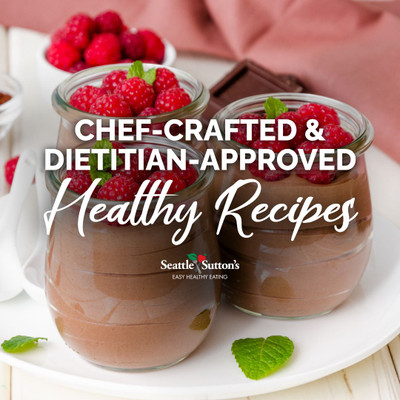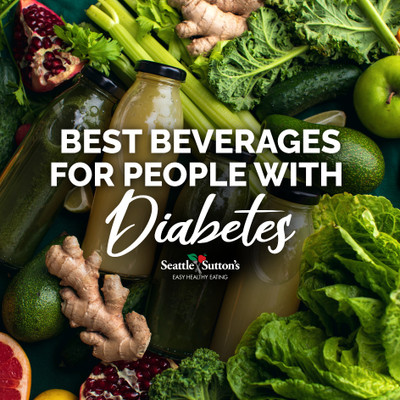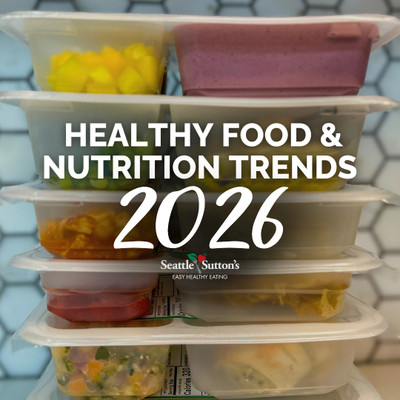Top 10 Nutrition Questions About Seattle Sutton's Healthy Eating
At Seattle Sutton’s Healthy Eating we aim to make healthy eating easy. Improving your health shouldn’t be complicated. The more complicated it is, the less likely we are to stick to it over time. That’s why our meal plans have been so effective in helping people improve health conditions, eat healthier to feel their best, and reach a healthy weight. We take the complicated out!
No shopping, cooking, meal planning… “and we don’t even mess up your kitchen” as Seattle says. If you are looking to achieve a health goal or have been on the fence about our healthy meal program, now may be the perfect time for us to review some of the most common questions we receive here at Seattle Sutton’s Healthy Eating.
1. I need a low salt diet. Are your meals low-sodium?
YES! All of our meal plans follow the guidelines set by the American Heart Association and the Dietary Guidelines for Americans and meet their sodium requirements. We minimize added salt in our meals by using a variety of herbs, spices, and aromatic vegetables to add flavor. The typical American diet contains about 1 ½ teaspoons of salt daily or 3,400 milligrams, nearly a third more than what is recommended for good health. Our sodium averages for each plan is as follows:
- 1200 calorie traditional plan averages 1500 mg per day
- 1200 calorie vegetarian plan averages 1550 mg per day
- 2000 calorie traditional plan averages 2230 mg per day
- 2000 calorie vegetarian plan averages 2190 mg per day
The American Heart Association recommends less than 2300 mg of sodium per day for most people. If you are over 51 years old, African American, or have high blood pressure, diabetes, or chronic kidney disease then the recommendation lowers to 1500 mg a day.
Customers will sometimes tell us they were told to follow a “No salt diet.” This is often a misunderstanding of the guidelines. Foods contain sodium naturally, so it is impossible to follow a no-salt diet. The body also requires a certain amount of sodium to function properly. Oftentimes, doctors prescribe a “No Salt Added” diet, meaning that you do not add table salt to your food and try to limit purchasing foods with added salt, such as canned vegetables or beans.
2. What if I don’t drink milk?
We understand that many people either don’t like milk or have difficulty tolerating it. While we do recommend the addition of 2-glasses of skim milk with our 1200 calorie plans and 3-glasses of low-fat milk to our 2000 calorie plans, these additions can be easily swapped for plant-based milk or used as ‘flex calories.’
We include dairy in our plans because it helps to balance our meal plans with the perfect blend of protein, calcium, vitamin D, and potassium. Dairy products contain the highest concentration of calcium per serving and are fortified with Vitamin D, which is crucial for overall good health and maintaining strong bones. Nutritionally speaking, lactose-free milk is the same as ‘regular milk’ as it only has the lactose removed and would be a great alternative if you have lactose intolerance. If you opt for a plant-based milk choose a variety that is higher in protein, unsweetened, and fortified with calcium and vitamin D.
“Flex calories” are a nice option to add some of your favorite food items to your Seattle Sutton’s meals or add some variety. To use “flex calories” in place of your milk servings, you would need to read the nutrition label and stick to around 80 calories. Some examples of items you could use as a “flex calories” option:
-A piece of fruit or 1 cup cut-up fruit
-Small side salad with 1 Tbsp. vinaigrette
-Veggie sticks with 2 Tbsp. hummus
-Low-fat yogurt
-Hard-boiled egg
-3 cups air-popped unsalted popcorn
Remember, all snacks are NOT created equal. If choosing to use “flex calories,” focus on snacks from whole, unprocessed sources. Pairing protein and high fiber carbohydrates can help keep you fullest longest. And don’t forget, it’s never a good idea to snack out of a box, carton, or bag. ALWAYS place a serving of your snack on a plate or bowl.
3.What if I don’t want the breakfast meals?
We have all heard that breakfast is the most important meal of the day. However, some people are just not breakfast eaters or prefer to make their own breakfast meals, and that is perfectly fine. You can still enjoy our delicious, healthy prepared meals without wasting the breakfast options. You have the flexibility of using the meals how you please. While we encourage everyone to eat breakfast daily, we understand that everyone has different needs and preferences.
Some ideas of how to utilize your breakfast meals include breaking up the breakfast meals as healthy snacks throughout the day or as an evening snack. Another option would be to purchase a partial week order and save the breakfast meals to supplement a lunch or dinner on the days that you are not receiving meals.You could also share your meals with a family member or friend. Maybe they would love the convenience of a freshly prepared breakfast for their busy mornings. Oftentimes customers end up loving the convenient breakfast meals.
Beginning fall 2025, Seattle Sutton's Healthy Eating will be allowing customers to choose their own meals. While we highly recommend individuals with an underlying medical condition or who are trying to lose weight stick with our dietitian-designed meal plans, if you do not have any dietary restrictions, you may choose to omit the breakfast meals from your meal set. More of what you love and less of what you can live without!
4. Do you have a diabetic menu?
Our healthy meal plans are designed for anyone to enjoy and improve their health. If you have diabetes, this is no different. According to the CDC, many people with type 2 diabetes can control their blood glucose by following a healthy meal plan and losing excess weight.
All of our meal plans meet the guidelines from the American Diabetes Association, and we focus on the right balance of healthy carbohydrates. Our meals include a variety of whole grains, beans and legumes, and fresh fruits and vegetables that are better for blood sugar control. While we do include an occasional treat with our meals, they are all portion controlled and often reformulated to contain better-for-you ingredients.
Since excess weight makes it harder for insulin to work properly, the calorie and portion control our program centers on can help improve insulin resistance. The ADA recommends losing weight to promote better blood sugar control and Seattle Sutton’s Healthy Eating meals are designed for safe, effective weight loss.
Individuals diagnosed with diabetes are at a higher risk for heart disease and are encouraged to follow a heart-healthy diet. All our meals contain NO trans-fat and meet the fat, saturated fat, and cholesterol guidelines set forth by the American Heart Association.
For those needing to count carbohydrates due to insulin or better blood sugar control, all of our meals are individually packaged with a nutrition label clearly outlining the carbohydrate and fiber content. Individual meals may range in total carbohydrates, but if the carbohydrates are lower or higher than what you are personally aiming for you can easily split your meals into 3 meals and 3 snacks.
5. How quickly will I lose weight?
Many of our customers report great success with their weight loss goals on our meal program. Since we focus on calorie and portion-control our plans are very helpful for losing unwanted pounds. Most often customers see weight loss after the first week of the plan. We recommend a weight loss goal of 1-3 pounds per week, but this amount can vary from person to person. Our 1200 calorie meal plan is the most commonly used for weight loss.
While many people hope to lose weight quickly, it is better to lose weight at a steady pace with changes that are maintainable over time. Our meal plans are designed to help anyone lose weight, however, each person may lose weight at varying rates on our program due to a variety of factors. If you exercise, are not a chronic dieter, are sticking 100% to the meal plan, and focusing on getting a good night’s sleep, you may have the best success for weight loss.
The proven formula for successful weight loss is to consume fewer calories than you burn off. With many diet plans, this means tedious calorie counting. With Seattle Sutton’s, you never have to worry about what you should or shouldn’t eat, or if you are eating the right amount. Each of our meal plans contains lean protein and high fiber fruits, vegetables, whole grains, and nuts. The combination of protein and fiber helps to keep you feeling full and keep your cravings under control. Studies have shown health benefits resulting from a weight reduction as low as 5-10 percent. This means that an individual that weighs 200 pounds will benefit greatly from losing 10-20 pounds.
If you are overweight or have excess weight to lose, most experts agree that aiming for a weight loss of 1-3 pounds a week is a safe and healthy goal. It’s important to keep in mind that weight loss does not follow a linear path. Some weeks you may lose more than others, the goal is that the trend overall is moving in the right direction.
6. Do you have a gluten-free plan?
Many of our meals are naturally gluten-free, however, we do not offer an entirely gluten-free meal plan. We recognize that many people cut gluten out of their diet unnecessarily, potentially eliminating healthy foods from their diet. Many people give up gluten because they think it’s a healthier way to eat, but unless you have a medical condition that requires a gluten-free diet, we believe it isn’t necessary.
Many specialty-made gluten-free products are denser and have more calories than their gluten-containing counterparts. Replacing all gluten containing products with gluten-free products could increase calorie content substantially, and could make it harder to lose weight. Gluten-free products are often made with refined grains and are low in nutrients.
Our delicious meal plans include a variety of whole grains, including wheat, rye, and barley; which all are gluten-containing grains. Whole grains are a major source of dietary fiber, which benefits our bowels, lowers cholesterol, aids weight loss, and may help improve blood glucose control. A study in the Journal of Human Nutrition and Dietetics which analyzed 1,700 different gluten-free products found that processed gluten-free foods had more fat, saturated fat, salt, and sugar than traditional foods. It’s possible to get the fiber you need from other gluten-free grains, but we believe that variety and a diverse diet benefits the body in numerous ways.
There is a small percentage of people that need to follow a strict gluten-free diet. We do not have the demand to accommodate the estimated 1% of Americans that require this diet. However, some of our meals are naturally gluten-free and all of our products are portion controlled so if you are gluten-sensitive and need to cut back on the amount of gluten in your diet, our plan may be just right for you.
As part of the Choose Your Own Meal plan, you can view and select meals that are naturally gluten free by choosing the "Gluten-Free" filter on the meal choice page. This option will be available to our customers in the fall of 2025.
7. How do my meals arrive?
We take extra steps to ensure food safety and retention of nutrients in our meals. All of our meal plans include fresh, never frozen or freeze-dried, meals. From fresh salads to homemade dressings and nut butters, we take pride in our freshly prepared meals. Each meal is packaged in a special air-tight container, then placed in a shipping box with insulated material to maintain its quality and freshness. This process meets the highest standards of safety and quality.
We have over 30 locations in the Chicagoland area where you can choose to pick up your meals or have them delivered to your house. We also offer 1-day delivery nationwide to ensure quick arrival and food safety. All of your meals arrive prepared and ready to go. There is no planning, shopping, or cooking needed. Simply reheat and enjoy!
8. Are your meals okay for something needing a renal diet?
Managing kidney disease requires you to control your blood pressure, blood sugar, cholesterol, and salt intake. The kidneys help to maintain the right balance of nutrients and minerals. If you have kidney disease, your kidneys struggle to do this job well and diet changes become vital.
In the early stages of kidney disease, patients are often recommended to limit sodium and possibly lower the amount of protein they are consuming. Following a diet similar to the DASH diet is often encouraged. Seattle Sutton’s Healthy Eating has many similarities to the DASH diet as it includes fresh fruits, vegetables, limits sodium, and focuses on plant-based proteins, poultry, and fish rather than red and processed meats.
Since all of our meal plans are low in sodium and meet the requirements set by the American Heart Association and American Diabetes Association, many health care professionals working with renal patients often feel confident recommending our program to their patients. The focus on portion control and balanced meals make our delicious and convenient meals suitable for individuals in the early stages of kidney disease.
Patients nearing or already established on dialysis may have additional diet needs including limiting potassium, phosphorus, and calcium. Small alterations to our meal recommendations, such as substituting plant-based milk for the dairy serving or an occasional swap in a fresh fruit, may be encouraged to lower the amount of potassium and phosphorus in the diet. However, the majority of meals can be enjoyed just as they arrive.
Protein may continue to need to be limited, or it may be increased while on dialysis. We are happy to provide our customers with a full nutritional analysis of our meals for review. Oftentimes, our plan can be continued during dialysis and may help with managing lab values since our meals are portion-controlled, balanced, and low in sodium.
9. What can I drink with my Seattle Sutton’s Healthy Eating meals?
Even if you are following our meal plan 100%, what you are drinking could be sabotaging your success. Beverages can be a hidden source of calories, carbohydrates, and added sugars. Oftentimes, people overlook what they are drinking as a reason for not seeing the results they are expecting on the scale, their blood sugars, or low energy levels.
While you are following Seattle Sutton’s Healthy Eating, we recommend that you stick with 0-calorie, unsweetened drinks that contain no artificial sweeteners or flavors such as water, black coffee, unsweetened tea, or fruit- or herb-infused water. For hydration, blood sugar control, and weight management water is your best option. The antioxidants in tea and coffee have been proven to have health benefits, just be sure to avoid adding sugar, honey, or sweetened creamers.
Each meal plan offered by Seattle Sutton’s Healthy Eating includes the addition of 2-3 servings of fat-free or low-fat milk as recommended by the Dietary Guidelines for Americans and the American Heart Association.
We discourage you from drinking regular or diet soda, sweetened tea, fruit drinks such as Vitamin Water or Hi-C, or sweetened coffee drinks such as Frappuccinos or lattes. The added sugars and sweeteners in these drinks may impact your health, add empty calories, and lead to more sugar cravings throughout the day.
10. What if I have different calorie goals than what is offered on your plans?
One of the great things about our meal plans is that there is flexibility which allows our meal plans to meet lots of different needs. We understand that each customer has different goals, different bodies, and different needs and there is no one-size-fits-all plan!
If your calorie needs do not fit into the 1200 or 2000 calorie plans we offer, there are ways to add or subtract calories to make our meal plans work for you. All of our meal plans are calculated with the addition of 2 to 3 servings of dairy. The calories from the dairy allow us to adjust the servings to meet the calories you need.
Need an 1800 calorie plan? If you choose the 2000 calorie plan and add only 1 glass of milk instead of 3, you will average 1800 calories. Need a 1500 calorie plan? Order the 1200 calorie plan and add in a healthy snack to help you get to your goal. Our healthy snacking guide is a great resource for adding in extra, healthy calories to your meal plan.
If at any point you are unsure how many calories would be best for you, we encourage you to reach out to one of our Registered Dietitians to help you determine which plan and if any add-on’s or changes would be best for your goals. Our team is ready and happy to help!
Thanks to our unwavering mission of providing quality, health-smart meals to our customers, we truly believe that Seattle Sutton’s Healthy Eating isn’t just diet food, it’s what you should eat for life. Let’s make 2026 a prosperous and healthy year. Seattle Sutton’s is here to help you do just that!

Interested in eating healthy? Hungry for more?







 Weight Loss
Weight Loss Health & Wellness
Health & Wellness Diabetes
Diabetes Heart Health
Heart Health Motherhood & Family
Motherhood & Family Dietary Restriction
Dietary Restriction Other Health Conditions
Other Health Conditions About SSHE
About SSHE


